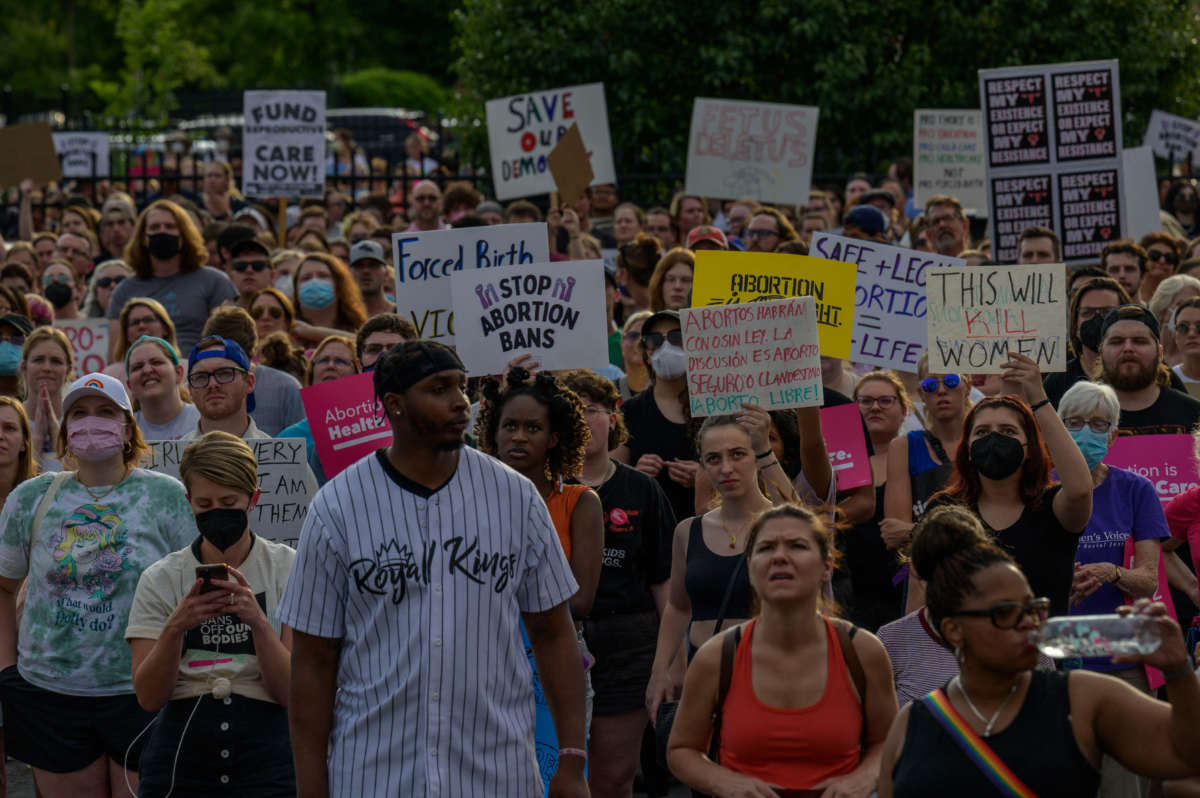Honest, paywall-free news is rare. Please support our boldly independent journalism with a donation of any size.
Due to a restrictive new anti-abortion law in Missouri, health care providers in the state are reportedly waiting until ectopic pregnancies become dangerous to provide medical treatment — despite the fact that such pregnancies are known to be painful, nonviable and potentially fatal to those who experience them.
In 2019, Republican lawmakers in the state passed a “trigger ban” on abortions that would take effect if Roe v. Wade, the 1973 landmark Supreme Court decision protecting abortion rights, was overturned. After the Court overturned that precedent last week, state Attorney General Eric Schmitt certified in a legal opinion that the trigger ban is now in effect.
The new law forbids anyone from inducing or performing an abortion on another person, and contains no exceptions for rape or incest. An abortion can only be performed when a person’s health or life is in danger, it stipulates.
But the Missouri law doesn’t specifically define when a pregnancy is deemed dangerous, one of the many ambiguities in the law that may make it difficult for health care providers to determine if an abortion can legally take place.
Ectopic pregnancies occur when a fertilized egg implants in an area outside of the uterus, usually within the fallopian tubes. These types of pregnancies are nonviable, and if left untreated, can cause severe pain or even death for a person who is experiencing one. Ectopic pregnancies can also make it difficult for a person to get pregnant in the future.
Early treatment is essential in ectopic pregnancies. In rare cases, they can resolve on their own, but most of the time, an abortion is required to protect the health of the pregnant person.
Due to the wording of the Missouri law, however, many patients are being told that they have to wait until their lives are in more immediate danger to get an abortion, according to Jane van Dis, an assistant professor of Obstetrics and Gynecology at the University of Rochester.
Missouri’s trigger ban specifically states that an abortion can only occur if a person’s pregnancy “create[s] a serious risk of substantial and irreversible physical impairment of a major bodily function.” In the early stages of an ectopic pregnancy, such a serious risk may not be documentable.
“We are now observing patients with ectopic pregnancy and hemoperitoneum until they have a documented falling hemoglobin or unstable vital signs,” van Dis wrote in a tweet on Tuesday, citing information from a colleague in Missouri.
Those who support reproductive rights have condemned Missouri’s new law.
“If he wanted to, @AGEricSchmitt could issue an opinion letter TODAY defining ‘medical emergency’ in a way that would save lives,” wrote Democratic state Rep. Sarah Unsicker. “If he wanted to. He should affirmatively state what he will not prosecute as an abortion.”
“This is like going to the doctor with appendicitis, doctor confirming appendicitis, and then waiting for your appendix to burst and poisoning your bloodstream before taking it out,” author Patrick S. Tomlinson said. “It’s medical malpractice.”
According to bioethicist and surgeon Louise Perkins King, medical professionals’ fears of being prosecuted for performing abortions too early in ectopic pregnancies are warranted.
“I’m sorry to report that ectopic pregnancy is absolutely in play” under the law, she said in a tweet that was part of a larger thread discussing the matter.
In subsequent posts, Perkins King elaborated:
Legally a “medical emergency” is a current not expected emergency. So the defense is that standard of care demands treatment ahead of emergent circumstances being actively present – but that violates the law. … Even with the language re reasonable judgment/medical emergency. I would still treat if I found myself in a restrictive state, but I would open myself to suit.
“So damned if I do, damned if I don’t,” Perkins King added. “And that’s the point with so much legislation that limits the rights of pregnant persons.”
Trump is silencing political dissent. We appeal for your support.
Progressive nonprofits are the latest target caught in Trump’s crosshairs. With the aim of eliminating political opposition, Trump and his sycophants are working to curb government funding, constrain private foundations, and even cut tax-exempt status from organizations he dislikes.
We’re concerned, because Truthout is not immune to such bad-faith attacks.
We can only resist Trump’s attacks by cultivating a strong base of support. The right-wing mediasphere is funded comfortably by billionaire owners and venture capitalist philanthropists. At Truthout, we have you.
Our fundraising campaign is over, but we fell a bit short and still need your help. Please take a meaningful action in the fight against authoritarianism: make a one-time or monthly donation to Truthout. If you have the means, please dig deep.
